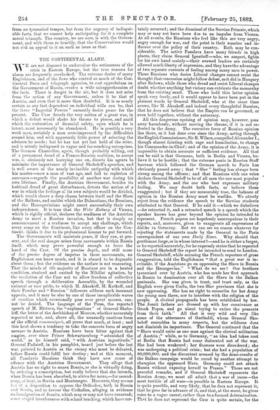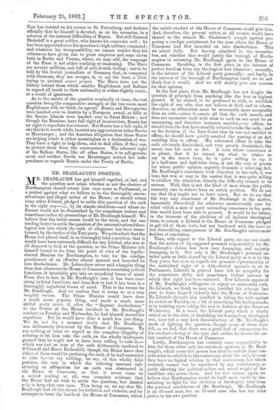THE CONTINENTAL ALARM.
WE are not disposed to undervalue the seriousness of the crisis in Eastern Europe, but the true reasons for alarm are frequently overlooked. The extreme desire of many Englishmen, and of the Jews who control so much of the Con- tinental Press and telegraph agencies, to cast opprobrium on the Government of Russia, creates a wide misapprehension of the facts. There is danger in the air, but it does not arise from the action of any Government, unless it be that of Austria, and even that is more than doubtful. It is as nearly certain as any fact dependent on individual wills can be, that the three " Imperial Powers " earnestly desire peace for the present. The Czar dreads the very notion of a great war, in which a defeat would shake his throne to pieces, and amid which the restoration of financial safety, upon which he is intent, must necessarily be abandoned. He is possibly a very weak man, certainly a man over-impressed by the difficulties around him, and with apparently little power of selecting the advisers he needs ; but he has not yet lost hold of the reins, and is utterly indisposed to vague and far-reaching enterprises. The German Chancellor, again, though probably willing, out of a permanent dread of a Franco-Russian coalition, to accept war, is obviously not hurrying one on, directs his agents to minimise the importance of General Skobeleffe speeches, and is well aware of the nearly invincible antipathy with which his master—now a man of vast age, and full to repletion of successes—regards the possibility of another war during his own lifetime. Finally, the Austrian Government, besides its habitual dread of great disturbances, detests the notion of a war in which the feelings of its own subjects would be divided, which would cleave a deep chasm between itself and the Slays of the Balkans, and amidst which the Dalmatians, the Bosnians, and the Herzegovinians might assert successfully their own independence. It is true that the Wehr Zeitung of Vienna, which is rigidly official, declares the readiness of the Austrian Army to meet a Russian invasion, but that is simply an announcement of a readiness to accept any challenge, which every army on the Continent, like every officer on the Con- tinent, thinks it due to its professional honour to put forward.
The Governments will maintain peace, if they can, at pre- sent, and the real danger arises from movements within Russia itself, which may prove powerful enough to force the hand of the Czar. Of the precise depth, and still more of the precise degree of impetus in these movements, no Englishman can know much, and it is absurd to be dogmatic about them ; but the evidence on the surface is not reassuring. That the minds of the majority of Russians are in a heated condition, strained and excited by the Nihilist agitation, by the resolution of the Czar not to allow freedom of collective speech through a deliberative Assembly, by the wounded national or race pride, to which M. Aksakoff, M. Katkoff, and their Panslav and " Russian " followers address such incessant appeals, and it may be also by one of those inexplicable waves of emotion which occasionally pass over great masses, can- not be denied. The language of the Press, the reported speech of M. Ilittovo, the •explanations " of General Skobe- leff, the letter of the Archbishop of Moscow, whether accurately reported or not, and, above all, the unusually cautious form of the official communique's, all prove that much, at least ; and this heat shows a tendency to take the concrete form of angry menace to Austria. Russians have been bitter against that empire, ever since Prince Schwartzenberg "astonished the world," as he himself said, " with Austrian ingratitude." General Fadaieff, in his pamphlet, issued just before the last war, pointed to Austria as the enemy who must be defeated, before Russia could fulfil her destiny ; and at this moment, all Panslavic Russians think they have new cause of offence with the Austrian Government. They allege that Austria has no right to annex Bosnia, as she is virtually doing, by ordering a conscription, but really believe that she intends, when Bosnia has been absorbed, to strive for more,—for ascend- ancy, at least, in Servia and Montenegro. Moreover, they accuse her of a disposition to oppress the Orthodox, both in Bosnia and Servia, and to favour the Catholics, alleging in evidence an immigration of Jesuits, which may or may not have occurred ; some stupid interferences with school teaching, which have cer-
thinly occurred; and the dismissal of the Servian Primate, which may or may not have been doe to an impulse from Vienna. At all events, the Russians who feel like this are very angry, angry enough for war, and the point is their number and in- fluence over the policy of their country. Both may be con- siderable. The active Panslays have many friends in high places, they claim General Ignatieff—who, we suspect, fights for his own hand mainly—their avowed leaders are certainly allowed much liberty of expression, and they have the advantage of two separate currents of feeling among many men in power. Those Russians who desire Liberal changes cannot resist the thought that concession might follow defeat, as it did in Hungary after Sadowa, while those who dread and resist Liberal changes doubt whether anything but victory can extricate the monarchy from the existing snarl. Those who hold this latter opinion speak very freely, and it would appear to have been put in the plainest words by General Skobeleff, who at the same time avows, like M. Aksakoff, and indeed every thoughtful Russian, that he does not believe that the Empire can be governed, or even held together, without the autocracy.
All this dangerous uprising of opinion may, however, pass away harmlessly, without moving the throne, if it is not re- fleeted in the Army. The executive force of Russian opinion lies there, as it has done ever since the Army, acting through the English Commissioner, Sir R. Wilson, compelled Alexander I., though almost fainting with rage and humiliation, to change his Commander-in-Chief ; and of the opinion of the Army, it is impossible to obtain accurate or sufficient evidence. All that can be said is that Germans, both in Berlin and Vienna, be- lieve it to be hostile ; that the extreme panic in Russian Staff bureaus which followed the German march to Paris has obviously passed away ; that " Slav " feeling has always been strong among the officers ; and that Russians with one voice declare General Skobeleff to be of all men the one most popular with the Army, and the one who best expresses military feeling. We may doubt both facts, or believe them exaggerated ; but if they are measurably true, the balance of opinion in the Russian Army must be warlike. We utterly reject from the evidence the speech to the Servian students attributed to that General. If he said it—which we disbelieve —he retracted it, and a retracted speech is a speech which the speaker knows has gone beyond the opinion he intended to represent. French papers are hopelessly unscrupulous in their reports, and, moreover, given to exaggerate all expressions of dislike to Germany. But we can see no reason whatever for rejecting the statements made by the General to the Paris correspondent of our own Daily News. Why should that gentleman forge, or in whose interest ?—and he is either a forger, or he reported accurately, for he expressly states that he repeated to General Skobeleff the report he intended to send to London. General Skobeleff, while accusing the French reporters of gross exaggeration, told the Englishman " that a great war is in- evitable, if the Austrians go on oppressing the Slays in Bosnia and the Herzegovina." " What do we see ? Our brothers tyrannised over by Austria, who has made her first approach in Bosnia to domination over all the Slays in the Balkan peninsula. She was given in trust, and trust only, as the English were given Corfu, the two Slav provinces that she is now oppressing. She has no right to conscribe for her Army the young men there, nor to interfere with the religion of the people. A clerical propaganda has been established by her. The Jesuit fathers are dressed up with her connivance as Greek Popes, and go about trying to entice the peasants from their faith." All that is very wild and very like some of the utterances of Garibaldi, whom General Sko- beleff resembles in many respects, but the wildness does not diminish its importance. The General continued that the " Slays would unite as one man against the clerical militarism of Austria ;" while, as to Germany, " an idea had taken root at Berlin that Russia had come dislocated out of the war. She had been weakened ; her finances were disordered; she- was undergoing a political crisis ; but she had a population of 80,000,000, and the discontent aroused by the demi-results of the Balkan campaign would be cured by another attempt to champion the oppressed Slays. Germany could not attack Russia without exposing herself to France." Those are not peaceful remarks, and if General Skobeleff represents the Russian Army, we must all admit that a war of races—the most terrible of all wars—is possible in Eastern Europe. It is quite possible, and very likely, that he does not represent it, that he goes far in advance of it, and that, at the worst, he gives voice to a vague unrest, rather than to a formed determination. That he does not represent the Czar is quite certain, for the Czar has insisted on his return to St. Petersburg, and declares officially that he himself is devoted, as on his accession, to a solution of the internal difficulties of Russia. But still General Skobeleff is a great soldier, who knows his comrades well ; he has been appointed since his speeches to high military command ; and whatever his irresponsibility, we cannot wonder that his utterances have given rise to great suspicion and some alarm both in Berlin and Vienna, where, we may add, the language of the Press is not either soothing or reassuring. The Slays are seventy millions, and full of anti-Jewish feeling ; and to be told by the Jewish journalists of Germany that, as compared with Germans, they are savages, is, to say the least, a little trying to national amour propre. The Slays have not the history behind them which enables Englishmen and Italians to regard all insult to their nationality as either slightly comic, or a result of ignorance.
As to the merits of the question nominally at issue, the real question being the comparative strength of the two races, most Englishmen will, we think, be agreed. Bosnia and Herzegovina were handed over to Austria by a European award, as fully as the Ionian Islands were handed over to Great Britain ; and though the Bosnians have full right of insurrection, Russia has no right to repudiate her consent. But Russia has a full right, if she thinks it worth while, to resist any aggression on either Servia or Montenegro ; and the Austrian allegation that those States are helping rebels is either meaningless or a declaration of war. They have a right to help them, and to find allies, if they can, to protect them from the consequences. The inherent right of the Balkan States, like all other States, is to self-govern- ment, and neither Servia nor Montenegro waived her inde- pendence as regards Bosnia under the Treaty of Berlin.



































 Previous page
Previous page